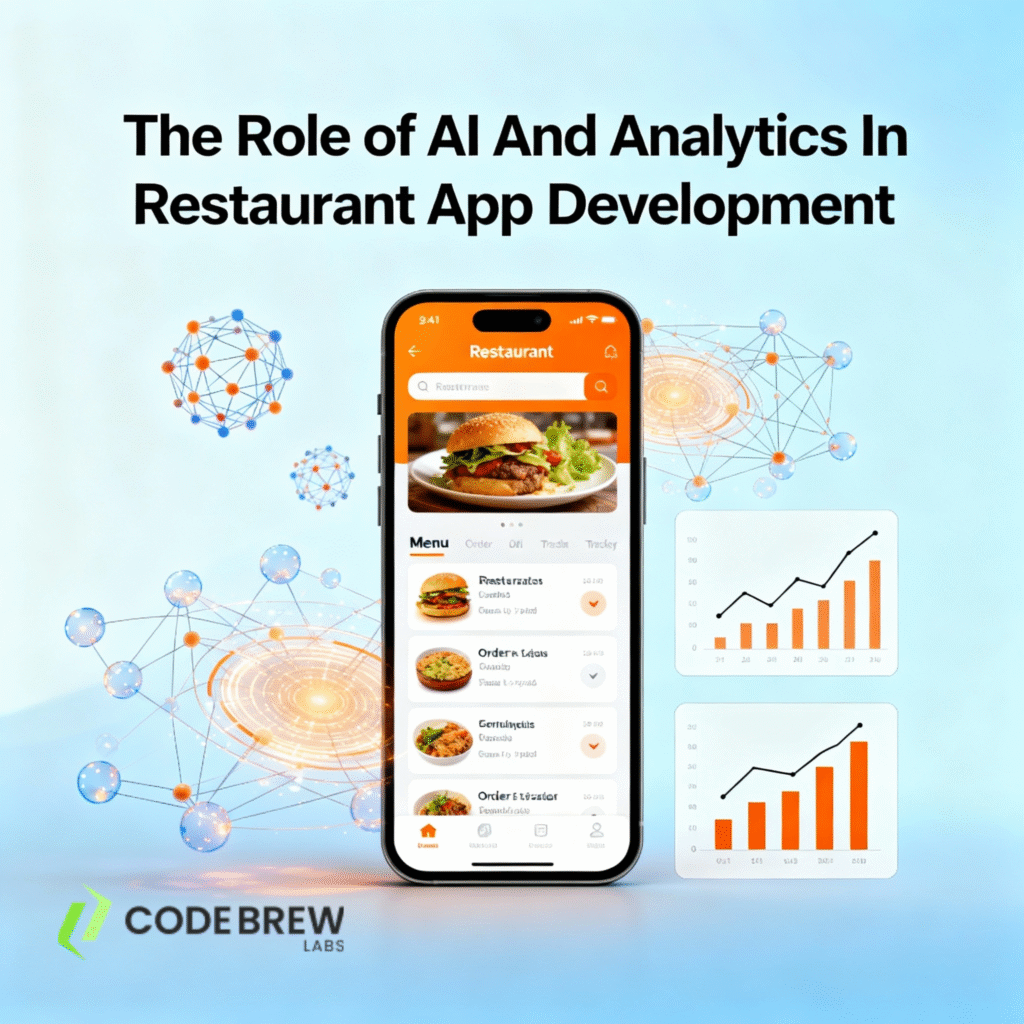
Introduction
Why Technology Is Revolutionizing the Restaurant Industry
The restaurant industry has witnessed a seismic shift in the past decade. From online reservations to food delivery apps, technology has reshaped how restaurants operate and interact with their customers. Smartphones, cloud computing, and AI technologies have made it possible for restaurants to automate operations, enhance customer experiences, and make data-driven decisions. Today, diners expect seamless experiences from personalized recommendations to real-time order tracking, and restaurants must innovate to stay competitive.
Modern restaurant apps go beyond just ordering; they integrate loyalty programs, push notifications, digital payments, and personalized promotions to keep customers engaged. Data analytics allows restaurants to understand customer preferences, optimize menus, and manage inventory efficiently. Additionally, features like table booking, contactless ordering, and AI-powered chat assistants have become essential to meet the expectations of tech-savvy diners. Restaurants that leverage these innovations not only improve operational efficiency but also build stronger relationships with their customers, driving loyalty, repeat business, and long-term growth.
The Importance of AI and Analytics in Modern Restaurant Apps
Artificial Intelligence (AI) and analytics are no longer optional; they are essential for modern restaurant apps. AI enables intelligent automation, personalized recommendations, and predictive ordering, enhancing every step of the customer journey. Analytics provides valuable insights into customer behavior, preferences, and operational efficiency, helping restaurant owners make data-driven decisions. Together, they empower restaurants to optimize staffing, manage inventory effectively, and create targeted marketing campaigns that increase revenue and customer loyalty.
Partnering with a reliable restaurant mobile app development company like Code Brew Labs ensures that these technologies are seamlessly integrated into your app. From AI-powered chatbots and recommendation engines to advanced analytics dashboards, our solutions help restaurants stay ahead of the competition while delivering a superior dining experience. With the right mobile app strategy, restaurants can not only meet but exceed modern diners’ expectations, fostering engagement, repeat business, and long-term growth.
Benefits of Integrating AI and Analytics for Restaurants
- Enhanced Customer Experience: Personalized menus, order recommendations, and predictive suggestions.
- Operational Efficiency: Optimized staffing, inventory management, and delivery routes.
- Revenue Growth: Targeted promotions, upselling, and loyalty programs based on predictive analytics.
- Data-Driven Decisions: Real-time insights for marketing, menu planning, and operational strategy.
Understanding AI in Restaurant App Development
What is AI in the Context of Restaurant Apps?
In restaurant apps, AI refers to technologies that enable systems to learn from data, recognize patterns, and perform tasks without constant human intervention. This includes virtual assistants, recommendation engines, and predictive analytics systems. AI goes beyond automation; it provides intelligent solutions that anticipate customer needs and streamline operations.
How AI Enhances Customer Experience
AI in restaurant apps can tailor experiences to individual customers. For example:
- Suggesting dishes based on past orders
- Sending notifications for special offers on favorite items
- Predicting delivery times accurately
- This level of personalization builds loyalty and encourages repeat business.
Common AI Features in Restaurant Apps
Chatbots and Virtual Assistants
AI-powered chatbots handle customer inquiries, take orders, and provide information 24/7, reducing wait times and improving service efficiency.
Personalized Recommendations
By analyzing user behavior and preferences, AI agents suggest menu items that a customer is likely to enjoy, increasing order value.
Smart Order Management
AI can optimize order workflows, predict peak times, and ensure efficient kitchen operations to reduce delays and errors.
The Power of Analytics in Restaurant Apps
What is Analytics for Restaurant Apps?
Analytics involves collecting, processing, and interpreting data to make informed business decisions. In restaurant apps, analytics can track customer behavior, operational efficiency, sales trends, and inventory patterns, giving owners actionable insights.
Types of Analytics Used
Descriptive Analytics: Understanding Past Performance
Analyzes historical data to understand trends, such as popular dishes, peak order times, and customer demographics.
Predictive Analytics: Forecasting Trends and Customer Behavior
Uses historical and real-time data to predict customer preferences, sales trends, and potential operational bottlenecks.
Prescriptive Analytics: Optimizing Operations and Marketing Strategies
Suggests actionable strategies, like dynamic pricing, targeted promotions, or menu adjustments, to maximize revenue and efficiency.
How Analytics Drives Business Decisions
Menu Optimization
Identifies best-selling items, underperforming dishes, and seasonal trends to refine offerings.
Customer Retention Strategies
Analyzes customer behavior to create loyalty programs, targeted campaigns, and personalized offers.
Operational Efficiency
Tracks kitchen performance, delivery times, and staffing patterns to improve resource allocation and reduce waste.
AI-Driven Features Transforming Restaurant Apps
Personalized Recommendations and Upselling
AI recommends complementary items or special deals based on customer preferences, increasing average order value and enhancing user satisfaction.
Automated Customer Support with AI Chatbots
AI chatbots answer questions, resolve complaints, and guide customers through the ordering process, improving response times and overall satisfaction.
Dynamic Pricing and Promotions
AI algorithms analyze demand, peak hours, and competitor pricing to adjust menu prices dynamically and run targeted promotions.
Predictive Inventory Management
AI predicts demand for ingredients, reducing food wastage and ensuring stock availability during peak hours.
Smart Delivery Routing and Logistics
AI optimizes delivery routes based on real-time traffic, weather, and distance, ensuring faster delivery and reduced operational costs.
How We Help in Building a Restaurant App
Our App Development Process
- Requirement Analysis and Research: Understanding your restaurant’s needs, target audience, and competition.
- UI/UX Design Tailored to Restaurant Needs: Crafting intuitive and engaging interfaces to enhance user experience.
- AI and Analytics Integration: Incorporating personalized recommendations, chatbots, predictive analytics, and operational intelligence.
- Testing and Quality Assurance: Rigorous testing to ensure the app performs flawlessly on all devices and platforms.
Technologies and Frameworks We Use
- Programming & AI: Python, TensorFlow, PyTorch
- Front-End Development: React Native, Flutter
- Back-End & Cloud: Node.js, AWS, Firebase
- Analytics & Data Processing: Google Analytics, SQL, BigQuery
Customization and Scalability
- Features suitable for small cafés, mid-size restaurants, or large chains
- Multi-language, multi-currency support
- Loyalty programs, online reservations, and multi-branch management
Post-Deployment Support
- Continuous updates and bug fixes
- AI model retraining and optimization
- Customer support for seamless app operation
How Much Does It Cost to Create a Restaurant App?
Factors Influencing Cost
- Complexity of AI features and analytics integration
- Number of platforms (iOS, Android, Web)
- Design, security, and scalability requirements
Cost Breakdown by App Type
- Basic Restaurant App: $5,000–$10,000 (simple ordering, menu display, basic analytics)
- Medium Complexity App with AI Features: $5,000–$25,000 (personalized recommendations, chatbots, predictive analytics)
- Advanced AI-Powered Restaurant App: $5,000-$25,000+ (dynamic pricing, smart logistics, multi-branch management, generative analytics)
Value and ROI Analysis
- Increased customer engagement and retention
- Higher average order values through upselling
- Reduced food wastage and operational inefficiencies
- Data-driven marketing strategies boosting revenue
Why Choose Us for Restaurant App Development?
Expertise in AI and Analytics Integration
Code Brew Labs specializes in creating apps with advanced AI features, from chatbots to predictive analytics, ensuring your app is smart and efficient.
Proven Track Record of Successful Restaurant Apps
We have delivered apps for restaurants of all sizes, improving operational efficiency and enhancing customer satisfaction.
Dedicated Team of Developers and Data Scientists
Our experts ensure your AI and analytics systems are built with precision, reliability, and scalability.
Focus on Security, Scalability, and Innovation
We prioritize secure data handling, scalable architecture, and continuous innovation to keep your app competitive.
End-to-End Support from Concept to Deployment
From brainstorming to post-launch support, we handle every stage of app development, ensuring a smooth and successful launch.
Future Trends in AI and Analytics for Restaurant Apps
- AI-Driven Voice Ordering and Smart Assistants: Voice-enabled ordering and AI concierge services.
- Real-Time Customer Sentiment Analysis: Understanding feedback instantly to improve service.
- Advanced Predictive Analytics: Forecasting menu demand, staffing needs, and sales trends.
- AR/VR Integration: Interactive menus, virtual dining experiences, and gamified customer engagement.
- Sustainable and Eco-Friendly Operations: AI-driven energy management, food waste reduction, and supply chain optimization.
Conclusion
AI and analytics are transforming the restaurant industry by enhancing customer experiences, improving operational efficiency, and driving revenue growth. Modern restaurant apps must leverage these technologies to stay competitive in a highly digital and data-driven market. By integrating AI and analytics, restaurants can offer personalized services, optimize operations, and make smarter business decisions. From predictive menu recommendations and dynamic pricing to real-time inventory management and demand forecasting, AI empowers restaurants to operate more efficiently while delighting customers.
Moreover, analytics provides actionable insights into customer behavior, ordering patterns, and peak hours, enabling restaurant owners to tailor marketing campaigns, streamline staffing, and reduce waste. In an era where diners expect seamless, personalized experiences from instant reservations to real-time order tracking, restaurants that fail to adopt AI-driven solutions risk falling behind. For any restaurant looking to grow and adapt, investing in an AI-powered app is no longer optional; it’s essential. Partnering with a trusted restaurant mobile app development company like Code Brew Labs ensures these advanced technologies are seamlessly integrated, helping restaurants boost engagement, loyalty, and long-term profitability.
FAQs
What is the role of AI in restaurant app development?
AI enhances personalization, automates operations, predicts customer behavior, and improves decision-making.
How does analytics improve restaurant operations?
Analytics provides insights into customer preferences, sales trends, inventory management, and operational efficiency.
Can small restaurants afford AI-powered apps?
Yes, basic AI-enabled restaurant apps start from around $5,000, making them accessible to small businesses.
How long does it take to build an AI-enabled restaurant app?
Depending on complexity, development may take 2–6 months, including AI integration and testing.
What are the latest trends in restaurant app technology?
Voice ordering, predictive analytics, AI chatbots, AR/VR experiences, and sustainable operations are leading trends.


